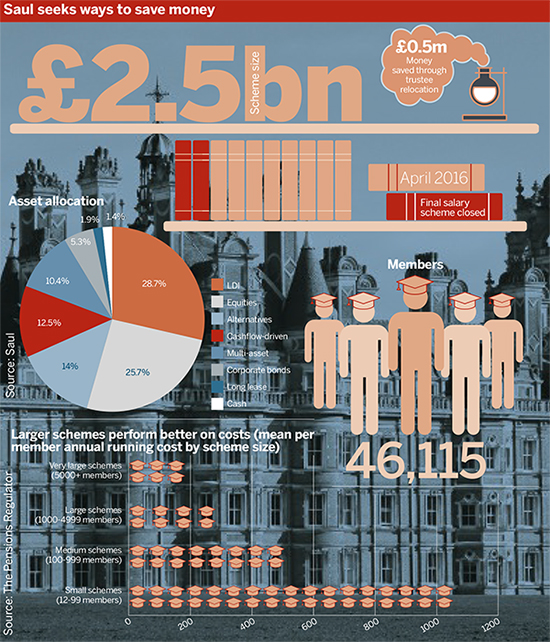The Superannuation Arrangements of the University of London has saved more than £500,000 by relocating its trustee team as part of a wider push to improve cost efficiency.
Whether trustees are looking to investigate investment costs or switch to a more cost-efficient communication system, money-saving measures have become a key concern for most schemes.
In an environment where it looks as though returns will be lower for longer, we all have a duty to look to our laurels when it comes to saving costs
Alan Pickering, Bestrustees
Saul, which provides pensions for non-academic staff of the University of London, has undertaken projects aiming “to reduce the cost of future service delivery, whilst maintaining high service standards”.
Reducing trustee costs
One of these changes, which was completed in July 2016, involved halving the office space available to the Saul Trustee Company from two floors to one floor of an office building in central London.
The scheme reassigned the lease on the other floor for the remainder of the lease term, “saving over £500,000 a year in rent and rates”.
Moving the trustee team was not the only cost-cutting commitment agreed during the year. The scheme said that “other projects were started… to allow further savings to be made”.
These projects, which were scheduled to be finalised in the 2016-17 period, include a review of the circa £2.5bn scheme’s IT infrastructure and approach to managing risk while ensuring “continuous improvement” of the scheme’s processes and service.

“Everybody’s trying to find ways to save money,” said Tim Middleton, technical consultant at the Pensions Management Institute.
Middleton said reducing costs by using less office space was an obvious decision to make, given the operational costs of running a large pension scheme.
Training and communications
But budget constraints can also affect the amount of training given to trustees, said Middleton. He warned that if the Pensions Regulator wants trustees to be better qualified, “then it’s important that trustee training isn’t overlooked and is properly supported by employers”.
Alan Pickering, chair of professional trustee company Bestrustees, said: “In an environment where it looks as though returns will be lower for longer, we all have a duty to look to our laurels when it comes to saving costs.” He cautioned, however, that “cheap is not always best”.
With regard to communicating with members cost-efficiently, Pickering said: “We must give them what they need, when they need it and by a method that suits them.”
Railways scheme on track with cost management

The Railways Pension Scheme has saved £100m in fees, having restructured its external management and pooled fund arrangements, but despite being cost-conscious, the fund remains focused on net returns.
Pickering noted that increased digitisation may well tick lots of boxes, but trustees should ensure that members are not overloaded with information.
Strike the right balance
Another useful way of ensuring value for money is “reviewing the way in which trustees do their job”, said Pickering.
Trustees need to concentrate on striking the right balance between email communication, teleconferences and face-to-face meetings, he explained.
Babcock takes member comms online to boost efficiency

The Babcock International Group Pension Scheme is moving its communications online in an attempt to cut costs, boost efficiency and better reflect the preferences of members.
Another useful way of ensuring value for money is “reviewing the way in which trustees do their job”, said Pickering.
Trustees need to concentrate on striking the right balance between email communication, teleconferences and face-to-face meetings, he explained.
However, “the latter will always have a part to play when it comes to dealing with lengthy and complex agendas”.
David Brooks, technical director at consultancy Broadstone, agreed that cost management is about finding a balance.
The key thing is laying out a budget for the year and sticking to it, he advised. “That’s something that’s happening more and more.”
To prevent any unwelcome surprises such as hefty fees, trustees “should ask [consultants and administrators] for an estimate upfront… before a project starts”, he said.
He added that cost management could be improved by having project timetables to streamline projects and prevent deadlines being overlooked, while setting deadlines makes it less likely a project will overrun and build up extra costs.

























